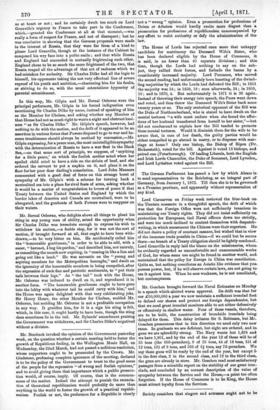In this way, Mr. Gilpin and Mr. Bernal Osborne were
the principal performers, Mr. Gilpin in his forced indignation even mentioning Sir Charles Dilke by name, instead of speaking of him as the Member for Chelsea, and asking whether any Member of that House had not as much right to waste a night and obstruct busi- ness "as Sir Charles Dilke." Mr. Gilpin's speech, however, had nothing to do with the motion, and the drift of it appeared to be an assertion in various forms that Powers disposed to go to war and be- come troublesome should always be soothed by concession,—Mr. Gilpin expressing, for a peace man, the most unintelligible sympathy with the determination of Russia to have a war fleet in the Black Sea,—on that same sort of principle, we suppose, of anything for a little peace,' on which the foolish mother acted when her spoiled child cried to have a ride on the sirloin of beef, and she ordered the servant to put a napkin on it, and place it on the floor for her poor dear darling's consolation. Lord John Manners commented with a good deal of force on this strange burst of sympathy of Mr. Gilpin's with a scheme for turning back a neutralized sea into a place for rival feats of arms, asking whether it would be a matter of congratulation to lovers of peace if that Treaty between the United States and England by which the border lakes of America and Canada are neutralized, were to be abrogated, and the gunboats of both Powers were to reappear on their waters.
































 Previous page
Previous page